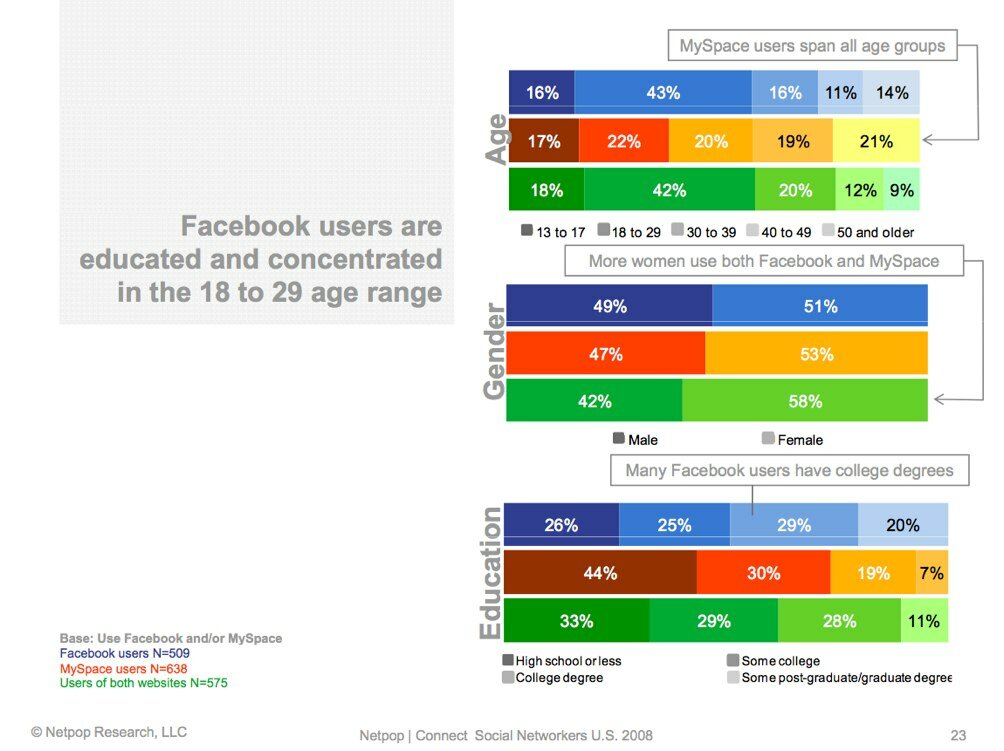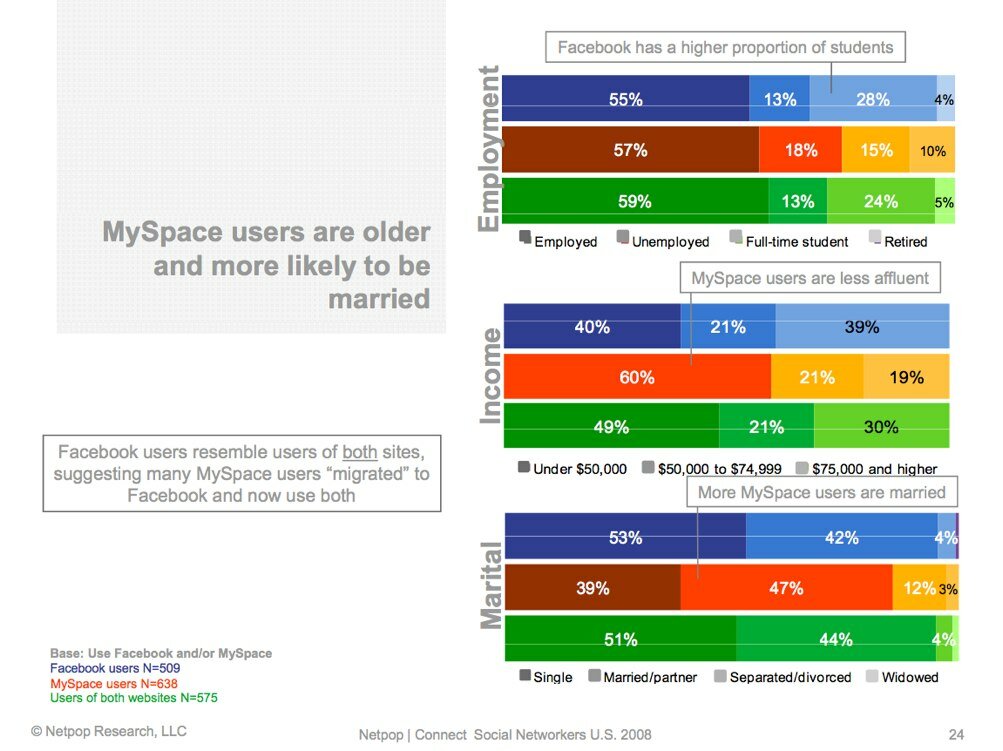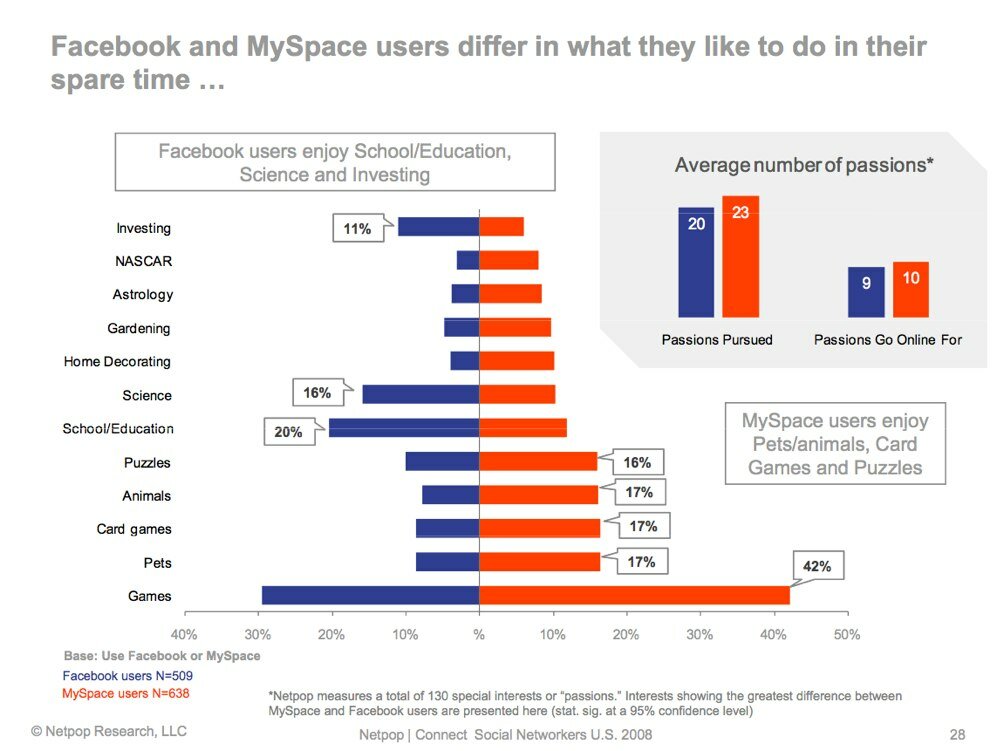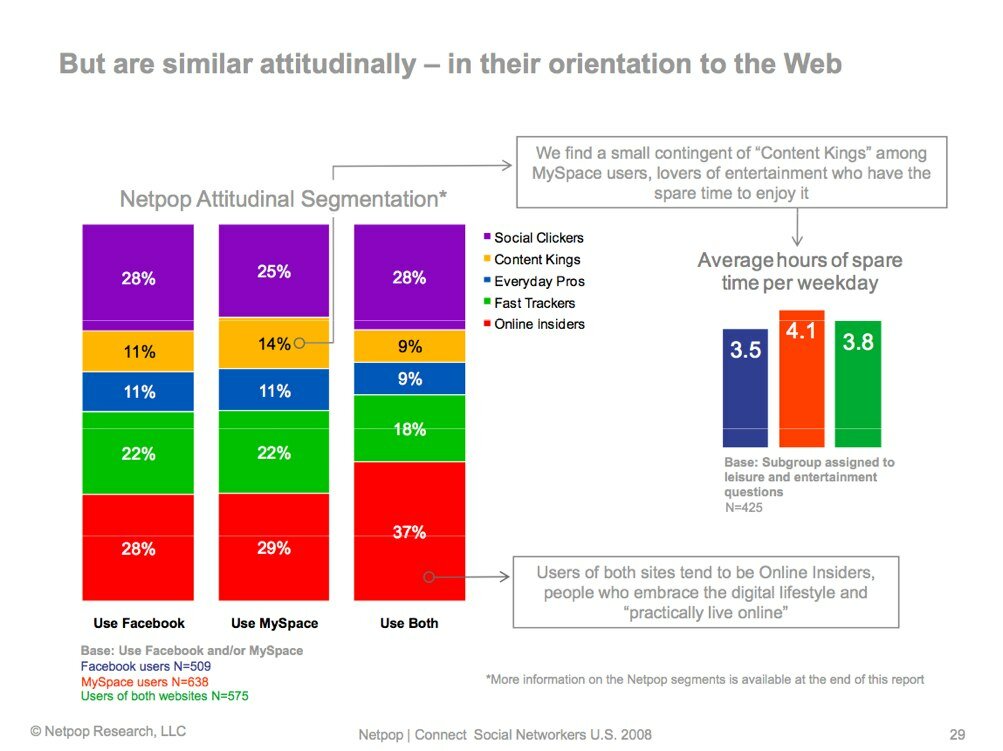Different social networks appeal to different people for different reasons. The two obvious giants when it comes to social media are MySpace and Facebook. A user’s preference for either network may speak to the differences in many other interests and online behaviors, but determining exactly where the similarities and differences lie could mean the difference between successful and unsuccessful outreach for marketing initiatives.
Even some of the most savvy social media marketers tend to have preconceived notions about who’s on what social network based on their personal experience within these networks. Although I would never want to discount the value of real participation in social networks, a little research can go a long way when it’s in the right hands.
A recent study conducted by Netpop Research seems a bit counterintuitive to some of the conventional wisdom regarding who’s on what platform when it comes to MySpace -vs- Facebook, as well as those who participate in both places.
Many still think of MySpace users as younger than those on Facebook. This may have been true before Facebook opened up to users other than those with a .edu email address, but the research indicates students are more likely to be on Facebook and MySpace users are indeed older and more likely to be married.
Netpop Research recently released a study that determined 76 percent of broadband users, or 40 million people, age 13 and older in the United States contribute to some type of social media site and 29 percent contribute regularly.
Other notable findings indicate:
- Facebook users connect with more people than MySpace users. In an average week, Facebook users connect with 17 people on a one-to-one basis and 82 people on a one-to-many basis. This is more than MySpace users or users of both networks.
- Users of both networks share similar online communication habits related to use of IM, discussion boards, blogs, VOIP, video conferencing and micro-blogging. However, users of both networks are much more likely to blog than those on only MySpace or Facebook exclusively.
- Facebook users use more devices to access the Internet, but MySpace users spend more time online.
Similar attitudes / Different interests
The population segments used by Netpop Research to describe a variety of broadband users include: Social Clickers*, Content Kings*, Everyday Pros*, Fast Trackers*, Online Insiders*
- Social Clickers* rely on the Internet to maintain relationships with friends and family and to seek out new friends. A generational divide runs through this group, yet all Social Clickers share a desired to connect and communicate with others online.
- Content Kings* pursue a wide range of diversions available on the web. Deciding when, where and how to access entertainment, Content Kings create their own entertainment experiences. Content Kings see the Internet primarily as an entertainment source, and spend an overwhelming amount of their time online in the pursuit of fun.
- Everyday Pros* use the web quickly and efficiently. They are less likely to express their ideas online, nor are they interested in engaging with others. Everyday Pros focus on accomplishing mundane activities online, like checking stocks and managing their bank accounts. Everyday pros are short on time and disinclined to linger online.
- Fast Trackers* flock to the web to get their daily dose of news, sports, and weather. With a constant need to stay up-to-date, this group use a mix of major and specialized sites to get what they need. Focused and efficient, Fast Trackers spend half of their time online pursuing the facts, news and information they crave.
- Online Insiders* do more of everything there is to do online. They know about the Internet and see themselves essentially “living online.” Online Insiders divide their online time more evenly across major areas of online involvement.
The Netpop Research study focused on social networking behavior of respondents in the U.S. based the results from an online survey of 4,384 broadband users age 13 and older. Respondents were offered a cash incentive to complete the study.
The study is chock full of useful and timely statistics related to participation in social networks and creation of user-generated content.
Here is the entire presentation:
Obviously I believe that some of the most useful information comes from its analysis of the different populations within the two major social networks, but there is no shortage of interesting findings in the presentation.
My belief is that MySpace is often overlooked or misunderstood for a variety of outreach programs because from a demographics standpoint, social media marketers and PR pros of all types are much more likely to be Facebook users, but this is just my hunch, I could be wrong.
What’s your take? What do the differences and similarities between users on MySpace and Facebook mean for those of us engaged in outreach? I’m interested to hear what everyone else thinks about all of this.
*The phrases used to describe the different populations of broadband users are trademarked by Netpop Research.

Tagged as: demographics, Facebook, marketing, MySpace, Netpop Research, pr, social media, Social network, statistics, web 2.0





![]()





{ 13 comments… read them below or add one }
Personally? I’d have to agree with the first statistics, if only because I know a lot of students who only stayed with Myspace for a short while before getting tired with it.
Sadly I think in most of the cases I know it’s really a matter of pretentiousness. Do you think the older generations have gotten to this stage yet? I’m not sure my father would even consider the audience.
This is very, very interesting! Thanks for posting this. I’ve got a deep interest in demographics and social networks lately.
I will be the first to admit that I am guilty as charged: I judge people who mainly use MySpace unfavorably. Is it fair of me? Probably not, but at least I admit it. Not to be a “click my junk” person, but I wrote something about my own personal observations of the evolution of MySpace & Facebook back in October, it’s here if you’re interested, but looking back at some of the things I said I’m wondering if I shouldn’t take them back.
Thanks again for posting this and feeding my recent hunger for stats and stuff.
I haven’t logged onto MySpace in months so I plead ignorance, but I recently chatted with several high school kids and they all use Facebook, not MySpace.
Which of the above categories do you associate yourself with, Shannon?
Shannon, Good Morning,
This is useful and very good content, thank you. I love your blog because of that; you add value for your readers. I intend to use this post as reference for a post I am working on for Search Engine Guide.
I have had this very discussion with many of my apartment friends and followers, who have actually suggested that we should drop MySpace, which I adamantly disagree. In our small business, we use both sites. When we look at our MySpace followers, it is easy to tell who is using it based on their last log in, and the following at MySpace is strong.
However, our facebook site is much more active based on actual threads and conversations with our residents. We are making true and real connections on facebook and participating in conversations.
James – I think there is a level of pretentiousness when it comes to strategic thinking re: MySpace vs Facebook for marketers who are seeking to incorporate social media into their communication strategies. However, understanding the differences in population and engagement helps us make better outreach decisions based on fact.
Stacy – I’m glad you could admit that, but I think that’s true of a lot of us who are more engaged in social media. The bottom line for me is that negative judgment of a community of people on any platform will only ever hinder my ability to reach them. Pragmatism rules.
Ari – your experience chatting with high school students corresponds with the results of this survey. I have profiles on both and probably fit more closely into the Online Insiders category. I am always connected to Facebook (both online and via a mobile Blackberry app), but a lot my out-of-state relatives use MySpace exclusively so I keep the profile and check it about one a week. My thinking about MySpace has changed because the organization I work for maintains profiles on both platforms. And, given the diversity of their fan base, it makes sense to do so.
Eric – I’m so glad you found this useful. We also have both profiles for the team and I think there is value in both, but the value is different. Noting the differences in interest and behavior helps adjust the outreach in each platform. My personal experience also indicates that users on MySpace have a higher level of comfort interacting directly with a brand whereas on Facebook, Twitter, etc., there is a much stronger response to a a person/people.
I’m still interested to see what others can add to this discussion. Great stuff so far!
I guess I ought to look at my spacebook profile again! The only reason I set one up was to have an idea of what my kids were up to and as a result ALL my myspace friends (except 2) are under the age of 16.
I began using Facebook because many of my friends in Canada were using it instead of myspace. A few years ago they considered it more of a Canadian platform and My space an American one. (wonder if there are any stats on that?)
Looking at my friends list, it doesn’t match the data at all, so without it, my personal view is skewed to believe an older crowd uses facebook. (obviously I’m older!)
Interestingly, those friends of my children have also friended me on facebook, and use facebook more often as a means of communication. Out of my friends, most range in age from 35 – 50, some in their 50′s and I even have a couple of family members in their 70′s who use it regularly for family communication. Commenting on a status update or pictures posted is so much easier than writing and mailing a letter to grandma!
As always, thanks for sharing Shannon, great information to get the brain in gear on a Sunday morning!
Oh and I should add that in the past few weeks I’ve noticed that a lot of my friends’ parents are on Facebook and I’d be lying if I said that didn’t creep me out a little. C’est la vie … or something.
Thanks for posting the info, Shannon. I’ve thought about FB and MS more along psychographic lines – to use an agency analogy: the creative types drifting more towards MS and the account handlers socializing on FB. The additional detail you’ve provided in your analysis as well as the deck will be helpful to convince risk-adverse institutions to re-consider MS.
Thanks for the data Shannon! I have added this information to my reading notes on my dissertation wiki. I may be able to cite you and NetPop as sources when it comes to writing. I look forward to more of your informative posts! Thanks for sharing!
Very nice post! I personally enjoy taking a look at demographics, and to an extent, agree with the data provided. But I’m guilty of judging people (unconsciously, not intentionally) based on which social network they prefer. But I’ve seen somewhat of a trend. My friends who live in more rural/into-the-country areas all do use MySpace. They find the simplicity of it all to be much more welcoming, and enjoy being able to customize their entire profile. I’ve tried to get them to give Facebook a shot, but have only succeeded with a few, and none of them use Facebook as their primary social network. A majority of my urban-based friends use Facebook, and this group is more tech savvy than the previously mentioned group. This isn’t to say that all rural-based people use MySpace or all urban-based people are tech savvy. It’s just something I’ve noticed with the people I’m acquainted with.
BUT, on another account, MySpace users (the ones I know) have a nice, friendly, creative edge to them while my Facebook friends’ personalities are more professional and serious. I’ve not logged into MySpace just because I couldn’t stand its look and feel.
Thanks so much for an informative article. But I still think that my oldest is too young to have a myspace page. Although when the time comes I will monitor it like there is no tomorrow. My kids aren’t even allowed on the computers with out me knowing what sites they are going to. I restrict/limit their access with the help of parental controls Ez Internet Timer. I schedule it to stop all kids’ online activity while I or my husband is out. Maybe someone consider that I too protective. But only I and my husband are responsible for what my children do. We are the bad guys, we say no, and do whats BEST for them. NOT what they want.
this was very informative. myspace seemed to be about the just music and party promoters (at least in chicago), while facebook has a personal and professional side that many types of users seem to navigate fine, in my experience. but this piece shows where i definitely made some mistakes in thinking there were only specific users on MS.
another problem with MS is the amount of bandwith it uses and that many employers block the site, while fb can be seen almost anywhere and updated from anywhere. with the new changes to fb, its seems like its are a cross between a more user friendly MS and twitter. having a profile on both has been tough because its hard splitting attention, especially when you’ve got twitter too. and while trying to start a new biz myself, i try being very careful about etiquette so i don’t engage in cyber stalking or being a predatory markerter in my networking.
Thanks to this blog! It is truly informative. It answered my questions about related topic. Keep it up guys!
{ 8 trackbacks }